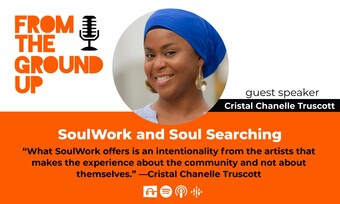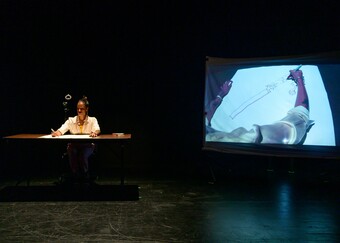Working Around the Problem
These are particularly tough times for live theater; even John Moore says it in a recent post: Live Theater Ranks Among 10 Worst Industries for 2013 (and he was named one of the twelve most influential theater critics by American Theatre Magazine in 2011). Young people in particular seem to be less and less interested in live theater (I was hearing this from educators back in 2007 while I was completing a Literary Internship at La Jolla Playhouse). Are we going to face the continuing crisis or run from it? Well, there might be a “third way” that doesn’t necessarily involve butting heads or participating in a rout. Let’s call it (for lack of a better phrase) Working Around the Problem.
If we can’t (or won’t or don’t) introduce young people to the joys of live theater while they’re still in school, there’s no way the stage can hope to compete (or even cooperate with) the dazzling cyberverse available to every kid at the touch of a tablet. Many—too many—small and medium-sized playhouses have simply vanished; faced with ongoing uncertainty in the arts sector, some large nonprofits have committed themselves to an ingenious, endowment-based management model that seeks to focus efforts on “non-ticket” revenue streams.
OK, so what do we do?
For what it’s worth, here’s my way of Working Around the Problem: I’ve been adding theater arts education and outreach activities to my usual playwriting. This might be—could be—a way to gain back some lost ground. If enough volunteers step up and create an expanding awareness of live theater, we might see a slow, steady restoration of theatrical interest and activity. This could come in new or less-familiar theatrical forms, but we need to take the long view. First survive, then stabilize, then thrive. I’m convinced that many small, individual efforts will have a beneficial, cumulative impact (“small is beautiful,” as they used to say).
After several years of designing new performing arts projects (along with engaging in public speaking about theater whenever I have the chance), I’ve been able to identify and serve a slowly-growing and surprisingly broad age-range of people who still have (or are willing to develop) an interest in live theater.
The latest of my DIY Education/Outreach projects recently found a home at Words Alive, a literacy nonprofit located in San Diego, California. Since 1999, Words Alive has been working with local schools to implement a variety of programs all aimed at helping young people develop a lifelong interest in reading. These are at-risk students who face extraordinarily difficult life challenges and don’t usually think of books when they think about recreation and fun. I thought Words Alive might be interested in adding plays to their growing list of reading material and I was very fortunate to connect with Chrissy Califf. Chrissy oversees about two-hundred and fifty volunteers and is also Program Manager of the Words Alive Adolescent Book Groups (ABG). ABGs use a facilitator and trained volunteers to conduct group discussions about books selected by the teaching staff for assigned reading. Chrissy thought that adding plays to the mix would be a great idea, and we were off and running with what we now call the Theater Module at Words Alive.
If we can’t (or won’t or don’t) introduce young people to the joys of live theater while they’re still in school, there’s no way the stage can hope to compete (or even cooperate with) the dazzling cyberverse available to every kid at the touch of a tablet.
Next, Chrissy had to find the most suitable school and teacher for our first Theater Module. She quickly settled on Dawn Miller at Lindsay Community Day School (located in downtown San Diego).
Now I really had to get busy. I read about one-hundred plays for young people (some just off the press and others pulled from storage). Once I had winnowed them down to around twenty I took the stack to the Words Alive offices and we went over them together (mostly talking about their advantages, disadvantages, subject theme, appropriateness, and usefulness to the class). Our stack of semifinalists then went off to Dawn Miller, who made the final selections.
In addition to class readings and discussions, I also suggested some ways to give the students a more direct and immediate experience of live theater. Fortunately, Chrissy was willing to consider just about any idea I wanted to discuss—guest lectures, field trips, etc. (The final decision is always up to the Words Alive staff.)
I floated the idea of guest lectures and in-class presentations and Chrissy gave me the go-ahead. I started making phone calls and sending emails to all kinds of theater people, drama departments, and local playhouses. I hit pay dirt relatively quickly with the Mesa College Dramatic Arts Department; Mesa Professor Kris Clark responded enthusiastically and will bring Words Alive students a special presentation about Commedia dell'Arte during the spring session.
Chrissy also liked the idea of requesting complimentary tickets from local theaters so the students could actually attend performances (something many of them haven’t had an opportunity to do). We decided that a ballet would be perfect for this aspect of the Theater Module, especially one based on a legend, story, or myth that the students could read and discuss beforehand. Jo Anne Emery, Managing Director of the City Ballet of San Diego, stepped right up—City Ballet will be hosting a group of Words Alive kids to a dress rehearsal of their production of Giselle.
The Theater Module is off to a very nice start, but we’re hoping this is just the start. We’ll keep at it—Working Around the Problem in our own, small way.











Comments
The article is just the start of the conversation—we want to know what you think about this subject, too! HowlRound is a space for knowledge-sharing, and we welcome spirited, thoughtful, and on-topic dialogue. Find our full comments policy here